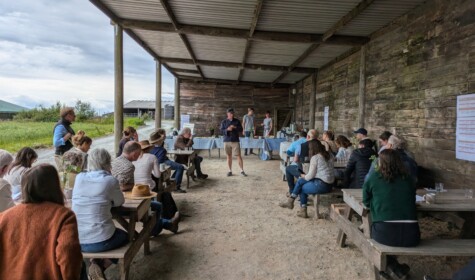Becky Holden leads a farm walk at our Beacon Farms launch event
I have had in the back of my mind for some time the idea that we could play our part in improving public understanding of how food is produced in a sustainable way. I am also concerned by the reality that most people, even those in rural areas but especially those living in cities, have very few opportunities to visit a farm, yet they are intimately connected with their food three times a day. If you go into a supermarket with the aim of finding out where your food was produced, its degree of sustainability or localness, you will likely leave disappointed. To counter this growing gulf in understanding, it’s clear that there is an opportunity to host many different farm gatherings.
On our farm we have hosted 40 visits over the last two years, ranging from schools, including pupils and teachers from primary, secondary and tertiary education; health professionals (a one-day gathering of NHS procurement executives); cookery training; weekend events including the Wales Permaculture Association and the Specialist Cheesemakers Association; several team days including the Welsh Government’s Health and Well-being of Future Generations team and the Agricultural Policy team; Young Farmers clubs; and farmer discussion groups.
Cumulatively, we have learnt a lot about what works and what doesn’t work when hosting visits, all of which we would love to share with members of the Beacon Farms Network, many of whom also have their own valuable experiences to share.
Regarding facilities, ours includes a converted threshing barn, with a church like atmosphere – albeit without a history of worship, although you might say that the seasonal threshing of oats over more than a century has left an atmosphere which is not unrelated to prayer!
We’ve put in underfloor heating, a wood burning stove, an adjacent eating area, a large kitchen with a beautiful ash table made from wood from the farm, an annex, plus toilet and shower facilities which collectively can easily cater for large gatherings.
“… most people, even those in rural areas but especially those living in cities, have very few opportunities to visit a farm, yet they are intimately connected with their food three times a day. If you go into a supermarket with the aim of finding out where your food was produced, its degree of sustainability or localness, you will likely leave disappointed. To counter this growing gulf in understanding, it’s clear that there is an opportunity to host many different farm gatherings.”
This meeting stage has now been augmented by sleeping accommodation comprising what will soon be nine bedrooms, two in nearby eco-cabins with catering facilities and bedrooms above the threshing barn kitchen area and the adjacent stable house, simple but all lined with ash and larch panelling, mostly sourced from our farm and planked up on our sawmill.
What is amazing to experience is the profound effect that visiting a working farm has on individuals. In our case, visitors are able to witness the processes of milking, cheesemaking and, this year, carrot growing, as well as the general daily and seasonal activities that characterise all farms everywhere.
Taken together, this facility, in our case largely financed by my dad’s legacy, plus additional borrowing, has created a wonderful stage for a whole range of meetings.
There are of course many other farm education networks out there, some promoting conventional farming practice, but all trying their best to improve people’s understanding of the story behind their food. We do not want to compete with any of the other initiatives in this field but rather complement them by sharing insights and resources.
Our aim is for the network to be mycelial and built on trust and transparency, to eventually stimulate a larger movement enabling hundreds of thousands, perhaps even millions of people to have a direct experience of food and farming, which hopefully will influence them for the rest of their lives.
As part of the newly launched Beacon Farms Network, the Sustainable Food Trust is also working in partnership with The Harmony Project, an educational initiative which supports farms in hosting school visits for young people aged between 5 and 14 years old. Through this partnership, we will develop and share a range of curriculum-linked resources and templates to help participating farms communicate their stories, whilst also supporting them to connect with local schools.
If you are interested in finding out more about the SFT’s Beacon Farms Network, please get in touch with our Head of Projects, Bonnie Welch, via email: bonnie@sustainablefoodtrust.org.





